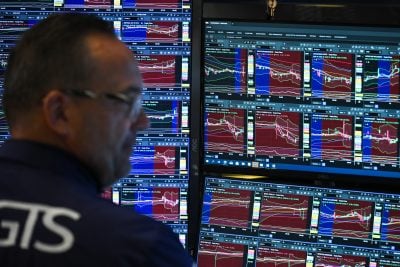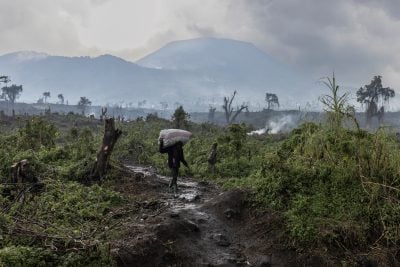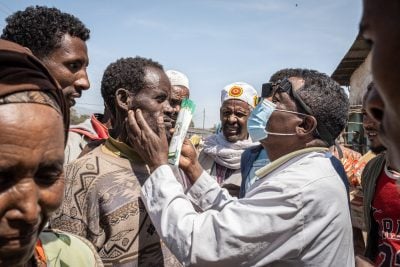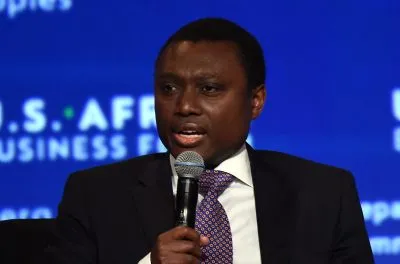African Business: We’re going through a turbulent economic climate. What does this mean for an institution like the IFC; do you have to step up and accelerate investment to provide countercyclical support or does it make investing more difficult?
Sérgio Pimenta: There are headwinds and it’s a situation in the world where there is a great deal of uncertainty. It is important to note that they are not the result of actions from emerging markets, as they are the ones facing the consequences of these exogenous shocks. When Covid hit, Africa was on a trajectory of strong growth and a trajectory of strong reduction of poverty and inequality.
To a certain extent on the health side, Africa was probably the continent the least impacted by Covid but then, when you look on the economic front, it’s actually had a disproportionate impact, and growth projections have slowed down, whereby we are at risk of seeing much of the progress being wiped out.
In that context, as a multilateral, we have the mandate to step up and do more, to be more imaginative and be bolder in what we do.
On the IFC side, within the World Bank Group, we focus on private sector development. In a context where you look at the level of indebtedness of countries, you look at the demand or the need for development – and the needs are high.
The capacity of governments to roll out funding for these needs is limited. So we absolutely need to focus on how we manage to get more private sector investment to come into Africa. This is our mandate; so we do feel that our mandate right now is even more important than it has ever been.
But actually, before the pandemic hit, we had a profound change in the IFC’s approach in emerging markets, with a much more developmental focus to our operations, and much more focus on what we can do to bring in more private sector interest in those markets.
When the pandemic hit, that approach was actually spot on, so we really accelerated our programmes, our initiatives and our projects and I envisage that this will be the case for the foreseeable future.
So, building a pipeline in today’s context is as easy as it was pre-pandemic?
Traditionally, IFC has been a financier of projects in emerging markets, led by the private sector. We would engage with sponsors, with companies, local companies, international companies, regional companies and we would finance them. We realised that this was not enough, primarily because of a lack of bankable projects.
What we decided to do is to launch a strategy which we refer to internally as ‘upstream’ working on project development, answering the question, ‘What would it take to bring in the private sector in country X and sector Y?’
This involves working with the government on regulation, working with development partners to bring in more expertise and more knowledge, and then working with the private sector to convince them to come and invest in the country.
Historically we had done it – it’s not that we never did it – but we decided two years before the pandemic to make it systematic.
There’s the interesting example of a solar project in Niger. The government came to us and said, “We have a rate of electrification that is one of the lowest in the world, the goal is to generate 30% of our power through sustainable sources by 2035.”
The government didn’t have the resources, so what did we need to do to bring in the private sector? We had already developed this initiative that we call Scaling Solar. It’s one where we work with the government, with the World Bank, with MIGA, with other development partners, where we come in with a standardised approach on how to develop solar farms and then help the government with a bidding system [to mobilise private sector interest].
We did this successfully in Zambia and Senegal, and then we actually took this model outside of Africa.
We presented this approach to the government of Niger. It’s not yet finalised but we’re making very rapid progress. And the government of Niger told us that they want to move very quickly and actually get this to close faster than anywhere else in the world.
When we first rolled this out in Zambia we brought in investors from Europe, companies that had never invested in Africa. So the role that the DFIs and the multilaterals have to play is not just a financing one but creating the framework that allows the private sector to be engaged.
Ultimately what you are saying is you are trying to correct market failures to facilitate investment. Coming back to the Niger and also the Zambia case studies, who would be of the off-taker? Would the off-taker be the government or the utility? How does it work?
That is one of the key issues. The off-taker in most of these countries, it’s true in Zambia and it’s true in Niger, is the utility company.
The problem that you have – and that’s why you talk about market failure, that’s why very often these projects don’t develop in those countries – is because the off-taker does not necessarily have the financial strength to be able to give comfort to the companies that will come and develop the project – the Independent Power Producers.
Part of the Scaling Solar solution is we work with the World Bank, which provides a partial risk guarantee to the government through the off-taker so the company knows that if the off-taker will not be able to pay, then the World Bank can step in.
That is the reason why at the same time, we work with the World Bank on the reform of the sector. If you have an off-taker that is not strong enough, a guarantee is nice but it means that you’re going to be called on it. It’s better to work to see how we can improve the utilities across Africa so that they can respect their obligations.
The beauty of this project is that the cost of solar today, especially with its economies of scale, is extremely low. It reduces the cost of electricity for the entire country. If you reduce the cost of the electricity then the financial sustainability of the utility company is actually easier to achieve.
Is energy the most important sector in terms of IFC investments?
It is one of our large sectors but our intervention in Africa is relatively well-balanced across sectors. In some years, energy projects are the largest investment, and recently our largest investments have been in the health sector with our work to support regional vaccine production. This includes the €600m long-term financing package from IFC and its partners last year for Aspen Pharmacare Holdings Ltd. So it changes year-on-year, but energy is one of the critical sectors and one of our largest portfolios.
Makhtar Diop, global head at the IFC, mentioned that IFC wanted to increase its balance sheet in Africa – so you are mobilising an additional $1bn annually to reach a target of $10bn annually by 2026?
Our target date is 2030. Following our capital increase, we made a commitment to increase the IFC’s overall interventions in emerging markets and more specifically in middle and low-income countries, and fragile countries.
These commitments are not regional, but when you look at the low-income countries, the larger number are in Africa. We translated this into our ambitions for Africa and we aim to reach $10bn of long-term financing in 2030.
It is likely with what is happening and the increase of our operations that we will actually accelerate the pace but our ambition is still that one.
Is that $10bn of your own capital or $10bn including what you manage to mobilise from other private sector players?
This is the total long-term finance, which comprises our own investments and what we mobilise from partners. I’m saying this because IFC also does short-term finance, supply chain finance, which is also rapidly increasing to help boost trade.
Last fiscal year we provided $3bn in short-term finance but that is not counted in the $10bn. We count it separately because it’s a different kind of financing, but still a very important one.
Overall, in the last fiscal year, we committed $9.4bn. This represents unprecedented volumes but more important than the absolute total is the fact that we conducted investments in 36 countries. IFC tended to be concentrated in some key markets and we’ve been expanding our footprint because we really want to have an impact across the continent.
Investors say they need to take more risk when they are investing on the continent, hence the need to ramp up equity investments as opposed to debt. What is your thinking there?
In an uncertain world I’m not sure what the most risky part or place or sector to invest in is!
It is true that for Africa, when you look at the way things have evolved in recent years, there have been a certain number of factors that contribute to the perception of risk and the risk on the ground.
When you go into a market that you perceive as risky, you want a risk return that is adjusted to the risk you are taking, and equity instruments usually give you a better return. That is why you would have a bigger focus on investing in equity.
IFC has continued to provide both equity and debt across all those markets and Africa is not an exception. We would like to invest more in equity because we feel that there is a strong demand for equity in Africa. It’s not driven by a risk return from our side as an institution. We are very driven by what we feel is needed in those countries and there is a need for more equity.
We will continue investing in equity but we don’t have this plan of saying, we are going to do X amount in equity, Y amount in debt.
We do have a financing goal as IFC and we look at the countries that need financing and the sectors that need it, and then the instrument we use is really linked to the sector or company and what they need. We invest on a case-by-case basis.
A while back, the IFC was encouraging more local currency bond issuances to stimulate more local currency lending. Is this still your thinking?
Our approach is exactly the same now. We see a very important need to develop local currency financing, for two reasons. One, because a lot of the demand that we see comes from local companies that are not necessarily exporting – and IFC has been making a lot of effort to shift more towards medium-sized companies, smaller companies and local companies that are generating their revenues in local currency. If we provide only dollar or euro financing, we are exposing them to a more significant risk.
We’ve been very active with central banks, with regulators to encourage the issuance of bonds in local currencies.
There is a second benefit and that is the development of local capital markets. When you look at all the countries that have experienced rapid development over the last century, one key component has been the mobilisation of domestic savings. If you don’t have a deep capital and debt market, domestic savings cannot be channelled into the economy as easily.
What is your take around climate finance? We hear large numbers being touted, but is capital coming into the continent?
We see that our clients and the companies we finance really are taking this seriously and they realise that this is a necessity for their business. Because of that, we see demand for both more climate-friendly products and climate financial products.
There is also much demand to help these companies be more climate-friendly in their activities. We have developed environment and social standards.
We launched an innovation called EDGE, which makes it easy for companies in emerging markets to design and certify resource-efficient and Zero Carbon buildings. There are very reputable and good certification systems in developed countries but they are expensive. Ours is a much simpler and more affordable system that allows small construction companies to certify their projects as green, which will help them attract that type of financing.
On green financing, we have also been very active. IFC invested in Egypt’s first private sector green bond. We’ve done the first operations in Africa with green components. It does start in the larger markets in Africa, such as in South Africa, Egypt or Kenya and then we replicate this model and roll it out to other markets.
This is an area where we see a lot of growth. In Africa last year we did $2.1bn of climate-related projects.
When you are mobilising other investors to come on board, what are their main concerns? Is it currency risk? Political risk? Regulatory environment?
Many investors are interested in Africa but they don’t have the people on the ground who know the market well enough. Typically, the investors we mobilise come with us because they rely on our country and market knowledge. We now have 30 offices on the continent. We can bring comfort to investors because we are there and we understand the local risk. We work with governments on improving the business environment. We work with different stakeholders to try to bring projects together.
Want to continue reading? Subscribe today.
You've read all your free articles for this month! Subscribe now to enjoy full access to our content.
Digital Monthly
£8.00 / month
Receive full unlimited access to our articles, opinions, podcasts and more.
Digital Yearly
£70.00 / year
Our best value offer - save £26 and gain access to all of our digital content for an entire year!

 Sign in with Google
Sign in with Google 





